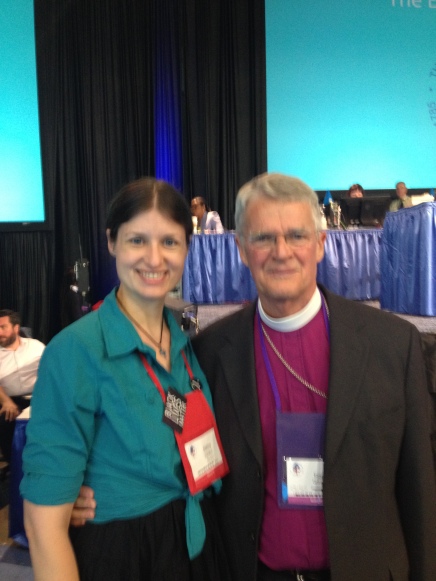Salt Lake City 2015
Day Nine: Miracles
Today something happened that I thought I’d never live to see, like water being turned to wine or an ocean pushed up into great walls: On the final day of convention the House of Deputies adjourned a half hour early, having completed all of the business put before it.
Back in Indianapolis in 2012, about three days from the end of convention, the Chair of the Committee on Dispatch came before the House to move for a suspension of the rules. He proposed a set of temporary changes, such as shortening both the time each person speaks and the total time for debate on any topic. As part of his explanation for the proposed changes he added a matter-of-fact, “We do this every time.”
He meant to ease our concerns by saying that it was a very normal and typical set of changes, but for me it was an indictment. What did it say about us that every time we met we had to scramble at the end, throwing in new Rules of Order and rushing through legislation to get it done in time?
But this year, we actually thought ahead. The President of the House of Deputies appointed a special committee to look at the Rules of Order and suggest changes to increase efficiency. They came to us with the new rules and we adopted them the first day.
My guess is the most impactful change was shortening the time given to each speaker from three minutes to two minutes. I didn’t notice a substantial change in the content I heard or the message I was able to share when I went to speak, so it seems we lost nothing with the time change. We also added a rule that if three people speak in favor and no one is in line to speak against, the President can call for an immediate vote. This is more helpful than it may seem to an outsider. Most of the legislation that comes before the House is not controversial, but we often spend a lot of time listening to people tell us to vote in favor of something we all already like.
Another change that seems to have helped a lot is the Resolutions Review Committee. This group looked at every single resolution for potential problems, and ensured each piece of legislation was being assigned to the proper committee for formal review.
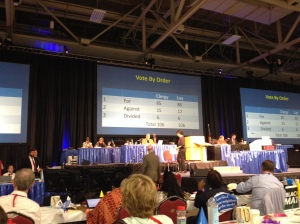 Then of course there’s the real hero, the monster we feared: the Virtual Binder. This was our first paperless convention, and it went amazingly well. There were occasional workarounds for unexpected exceptions, but on the whole the technology functioned exactly as planned. Pre-filed amendments were easy to see and reference, which meant no more time wasted reading everything aloud three times and answering a dozen clarifying questions. Supplemental calendars appeared automatically on our screens in real time, which meant no more five minute breaks just to distribute paper. No more picking up the daily calendar from the boxes at the front of the House. No more flipping back to yesterday’s calendar to see what we didn’t get to. No more getting lost because you put your pages in wrong. No more showing up 10 minutes early to get everything filed. And most importantly, no more incessant binder ring clicking during opening prayer.
Then of course there’s the real hero, the monster we feared: the Virtual Binder. This was our first paperless convention, and it went amazingly well. There were occasional workarounds for unexpected exceptions, but on the whole the technology functioned exactly as planned. Pre-filed amendments were easy to see and reference, which meant no more time wasted reading everything aloud three times and answering a dozen clarifying questions. Supplemental calendars appeared automatically on our screens in real time, which meant no more five minute breaks just to distribute paper. No more picking up the daily calendar from the boxes at the front of the House. No more flipping back to yesterday’s calendar to see what we didn’t get to. No more getting lost because you put your pages in wrong. No more showing up 10 minutes early to get everything filed. And most importantly, no more incessant binder ring clicking during opening prayer.
There were certainly other factors, many of which are impossible to pin down. Perhaps we had fewer controversial resolutions overall. Maybe this group of deputies was just a little less argumentative. Perhaps the committee appointments were more appropriate. It could have been the more hands-on approach that Dispatch took, or the incredible ability of our parliamentarian to always have the right answer and be able to explain it clearly.
No matter how the stars managed to align, I never thought we could have a convention where we actually completed all the work we set out to do in a civil and timely manner. We even managed to have a reasonable and successful debate about the budget! Perhaps there’s hope for us yet. Perhaps the dream of a five day convention is closer than we think. Perhaps one day I’ll be part of a group of grizzled old veterans, going on about how in my day we had to take off two weeks from work to go to convention, and about how I still hear binder clicking in my sleep…
NOTE: Convention is over and I’m on my way home, however I plan to write a couple additional posts related to this year’s convention. Look for them in the coming week, as I am most certainly taking a break for the holiday weekend.
Day Eight: Worshipping Ourselves
I am not against raucous appreciation. The occasional standing ovation is fine. It’s important to honor people, and occasionally to show our overwhelming support. But it’s time we face it. We have a problem.
Every addiction comes with enablers, and I think our biggest one is the Legislative Committee on Privilege & Courtesy. So far we’ve had 27 resolutions from this committee, and we aren’t done yet. Privilege and Courtesy resolutions exist only to commend and thank people. So there’s one thanking the volunteers, one for the people who organize worship, one about the Official Youth Presence, etc. But there also individual resolutions for the President, the Parliamentarian, the Secretary, the former Secretary, the treasurer, etc. The list goes on and on, and we’ve been giving a standing ovation for almost every single person after their resolution passes. I’m not saying these aren’t great people or that they aren’t doing great work. It just seems to be a bit…much.
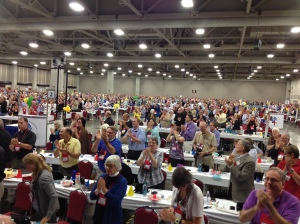 Our desire to excessively thank people is part of a larger issue that I’ve noticed at this year’s convention. We seem really eager to pat ourselves on the back these days. We had the President give an acceptance speech even though she was running uncontested and her election was only a formality. We spent a while praising the legacy of the outgoing Presiding Bishop, despite every indication that she hates receiving excessive praise. We applauded ourselves for having more Young Adult deputies than ever before, even though the actual number is still embarrassingly small. And sometimes after we pass a resolution, someone goes to the microphone for a point of personal privilege just to thank us for passing the resolution. We haven’t even done anything with it and we are already getting thanked.
Our desire to excessively thank people is part of a larger issue that I’ve noticed at this year’s convention. We seem really eager to pat ourselves on the back these days. We had the President give an acceptance speech even though she was running uncontested and her election was only a formality. We spent a while praising the legacy of the outgoing Presiding Bishop, despite every indication that she hates receiving excessive praise. We applauded ourselves for having more Young Adult deputies than ever before, even though the actual number is still embarrassingly small. And sometimes after we pass a resolution, someone goes to the microphone for a point of personal privilege just to thank us for passing the resolution. We haven’t even done anything with it and we are already getting thanked.
Yesterday a deputy from a nearby table asked me, “Are we doing actual business this afternoon, or is there another thing?” He wasn’t being snarky. He actually wondered if we were planning on doing work or if yet another thank you speech followed by thunderous applause was scheduled.
We talk all the time about the length of convention. With nine legislative days and two additional committee and orientation days, it’s a lot to ask of a person. Most deputies with regular jobs are using their entire vacation to be here. The length of the convention forces the average age up, because most people can’t do it until they’re retired.
This year we have been amazingly efficient due to some great procedural changes that were adopted. Yet we still had to go until 7:30PM tonight. And we are still using the full nine days. And every time the adorable chair of the committee on Privilege & Courtesy gets up on the platform, I have to ask, “Isn’t there a better way to thank someone?”
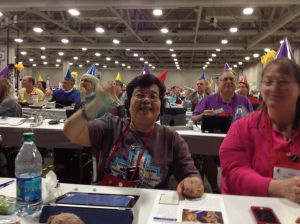 I think it’s important to show appreciation, and I believe we should give a standing ovation to the volunteers. But I worry that every time we praise anyone who is currently in office, we take a step closer to idolatry. We are praising the person and the position, holding them up like the royalty we so pointedly got rid of 230 years ago.
I think it’s important to show appreciation, and I believe we should give a standing ovation to the volunteers. But I worry that every time we praise anyone who is currently in office, we take a step closer to idolatry. We are praising the person and the position, holding them up like the royalty we so pointedly got rid of 230 years ago.
After years of shrinking numbers and tightened budgets, I understand that it feels good to feel good about ourselves again. There’s a renewed energy around growth and mission, around fixing the world one Episcopalian at a time. But I don’t want us to lose our humility.
Humility is the greatest gift religion ever gave me. My faith tells me that there is something greater than my small concerns, and that thought keeps me honest and whole. When we’re at General Convention, the real world tends to disappear. We start to think what we’re doing is very important. We think the whole world is watching. The legislative live streaming and twitter hashtags aren’t helping, because all they do is prove that at least some of the world really IS watching. Ultimately these feelings are just a side effect of working 15 hour days and never making it more than two blocks from the convention center. In the end, we’re a small denomination and most people will never know or care about most of what we do here. Our work is unsung, un-applauded. And it should be.
I think we are a wonderful church with a beautiful liturgical tradition, some great theology, and an army of people doing good work in the world. But those things can speak for themselves. We are called to be servants, not heroes. We are here to do the work of God, and to find ways to enable and equip others to do that work. The rest is, and should be, silence.
Day Seven: The Episcopal Church Marries You
I am too happy and tired to write much, so I will have to leave you with the cliff notes version.
It’s been a long road.
2003: Consent to the consecration of Gene Robinson, the first openly gay bishop.
2006: A step backward. Our membership fights with itself, and the Anglican Communion asks for restraint when we elect bishops. We tell them we’ll be careful.
2009: The Anglican Communion asks that we be more cautious with who we elect to be a bishop. Our response: God calls people to be bishops – we won’t get in the way. In addition, we take the first baby steps in the Same-Sex Blessing process, and bishops are given permission to use “generous pastoral response” to both participate in the process and adapt to the changing legal contexts.
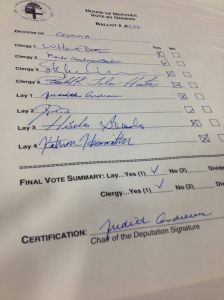 2012: The Standing Commission on Liturgy and Music took three years to research existing blessing liturgies and craft one of their own. We approve its provisional use under the direction of the bishop. Many bishops take full advantage of their generous pastoral response and allow variations of same-sex marriage, depending on local laws. Changes are made to ensure there can be no discrimination based on gender identity, giving safety and acknowledgment to our existing trans members and clergy.
2012: The Standing Commission on Liturgy and Music took three years to research existing blessing liturgies and craft one of their own. We approve its provisional use under the direction of the bishop. Many bishops take full advantage of their generous pastoral response and allow variations of same-sex marriage, depending on local laws. Changes are made to ensure there can be no discrimination based on gender identity, giving safety and acknowledgment to our existing trans members and clergy.
2015: We change the marriage canon to remove gendered language, and approve several possible liturgies for trial use (meaning one day they may be in the Book of Common Prayer). Bishops are still allowed to control the use of the liturgies within their diocese, however they must make provisions for couples wishing to get married (this language is intentionally vague to give bishops a lot of wiggle room, as we still have members who wrestle with this issue).
No matter what, there is no denying it now: we have full, wonderful, complete, gay marriage within the Episcopal Church.
It’s been a long week. It’s been a long 12 years. It’s been 40 years, or maybe 230 years. But we finally did it. We finally lived up to our motto:
The Episcopal Church Welcomes You.
Day Six: Memories
I had a post in mind for tonight, but as I was drafting it I realized that I need to let the thought gestate a bit more before publication. Instead, here’s a fuzzy picture and a little story.
In 2002 I attended EYE, the Episcopal Youth Event. It was held in Laramie, Wyoming, and teenagers from all over the church came to live and worship and have fun together for a few days. During that EYE, we were visited by the then Presiding Bishop, Frank Griswold. I’d never met or even seen a Presiding Bishop before, and I felt just a bit fancy knowing he came all the way to the tiny town of Laramie just to be with us.
During his visit, he blessed a pile of colorful crosses and gave one to every single youth in attendance. The cross was beautiful, a combination of red and green and blue. I really treasured mine, always remembering that it was the cross the Presiding Bishop blessed. This morning as I was getting dressed, I looked at the necklaces I brought with me and picked up the Presiding Bishop cross. It matched my shirt.
Today as we were remembering the work of outgoing Presiding Bishop Katharine Jefferts-Schori, we were surprised by a special guest speaker: Frank Griswold. I hadn’t actually seen him since that day in Wyoming.
After all the speeches were done and the House was in recess, I ran up to snag him before he disappeared behind the curtain. I was holding my phone in my hand and a man nearby asked if I wanted a picture with Bishop Griswold. We took the photo, but I quickly let the bishop know that’s not why I wanted to see him. I told him my story and held out the cross on my neck. He smiled that smile of a person who wasn’t expecting something sweet to happen to him today, and an aid quickly jumped in to get him away from the crowd.
I looked at the photo that the stranger took. No good. But it didn’t matter. I could never treasure a photo as much as a cross.
Day Five: In Which I Get Up to Speak in the House of Deputies
“The next item on the calendar is A037: Continue Work of the Task Force on the Study of Marriage”
(For the full text of the resolution, click here)
Explanation (adapted from text written by the Task Force on Marriage):
The 77th General Convention directed its presiding officers to appoint a Task Force on the Study of Marriage, consisting of 12 people to consult, study, and provide educational resources on the subject of marriage.
In the course of completing these tasks, the Task Force became highly aware of a growing contemporary reality in society and the Church that is redefining what many mean by “family” or “household.” This changing reality is felt in our congregations, where there are an increasing number of those who fit the various categories detailed in the 3rd Resolve of this resolution (those who choose to remain single; unmarried persons in intimate relationships; couples who cohabitate; couples who desire a blessing, etc).
Contemporary data shows that these trends are increasing rapidly, challenging marriage as a normative way of life. And yet the Task Force did not have the time or resources to fully address this reality. More broadly, our Church has done very little to respond to it.
This time of flux bears continuing discernment and attention by our Church.
“I call on Deputy Hamilton from the Diocese of Olympia.”
(The clock begins to count down my two minutes)
I rise in support of this resolution.
For the last six years I have been in a monogamous, loving relationship with my boyfriend. We live together and share some expenses. Despite the admirable and well-meaning efforts of friends and family, I have no interest in getting married or having children. While that may not always be the case, for now my relationship is not seen as having any independent worth, but only as a precursor to something I don’t intend to do.
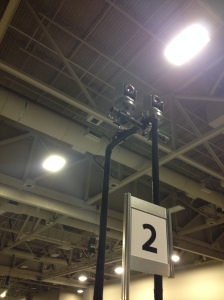 The church’s silence on this matter equates to passive judgement. By only acknowledging one kind of family, we imply others don’t count.
The church’s silence on this matter equates to passive judgement. By only acknowledging one kind of family, we imply others don’t count.
In Sunday School I teach my students that when it comes to sacramental rites (marriage, ordination, confirmation, confession, and anointing of the sick), we say that “all may, some should, none must.” However right now it’s clear that when it comes to marriage, we have acquiesced to secular society in saying that for marriage, “All Must Eventually.”
We don’t assume all lay people will be ordained, yet we assume all single people will eventually be married. I think this contradiction bears investigation, and it would mean a lot to me personally for my relationship to be acknowledged.
(I put down my official notes to speak off the cuff)
Finally, for any of you who are considering finding me after the session, putting a loving hand on my shoulder, and telling me I’ll change my mind when I’m older…I invite your silent prayers.
Day Four: In Which I Talk About Jesus
Today I was crossing the street from my hotel to the convention center. I saw a man approaching who appeared to be homeless. This wasn’t surprising, as there have been many homeless men and women around the convention center. I can’t be the only one who has felt a strange contradiction well up inside each time I see a homeless person begging for money but pass by in order to get to my church meeting.
And I have been passing them by. I do it at home as well. I opt to donate money in large chunks to established organizations rather than to individuals I encounter. I mainly do this because I am pretty meticulous about tracking my finances, including donations. Plus I don’t want to leave my charity up to chance, and I know I will not always be able to stop and give money to every person who asks. It feels weird to give to some and not others, which is dumb. I am an equal opportunity ignorer. It’s not a perfect plan, but it’s what I’ve been doing in life thus far.
But today there was this man. He looked up at me with a friendly smile and asked, “Miss, could you spare a dollar?” He was tall and thin, a white man with slightly long brown hair and a bit of a beard.
Yeah. He looked like Jesus.
Not just any Jesus. He looked exactly like that stupid, invented, European white Jesus that we’ve all been raised on. It’s that image you can’t shake, even though you know the real Jesus would have looked nothing like that.
At the end of chapter 25 in the Gospel of Matthew, Jesus tells a story about what will happen at the end of time, when all will be asked to account for their actions. Those who come with him are told they are being rewarded because they fed him when he was hungry, took care of him when he was sick, and a whole host of other things.
But they are confused. “When did we do that?” they ask. “When did we help you?”
He says, “Just as you did it to the least of these, you did it to me.”
It’s one of the most straight-forward things Jesus ever says. Take care of those at the bottom of society, and you are doing right by him. Just for good measure, here’s a list of concrete actions to take: feed, hydrate, clothe, welcome, care, visit. He is present in the least of these. If you love Jesus, you will love them and respond to this list of basic needs.
And there I was, positive of at least one crisp dollar in my bag, not running late for any part of my church convention, and staring at a smiling man who actually looked exactly like my stupid anglo-centric image of Jesus. I don’t know how much more obvious it gets. I handed him the dollar he asked for, smiled, and told him to spend it well.
Tomorrow morning I’m going to get change from one of the local coffee shops and start keeping one dollar bills in my pocket, easily accessible to give to every person who asks for them here in Salt Lake City. I may not be able to live my life like this every day, but I can certainly stand to do it for the next five days.
I owe him that much at least.
Day Three: The Beautiful Sausage-Making of a Presiding Bishop’s Election
Here is the whole story, for anything less would make it seem like it was easy.
At around 10:45AM the worship services ended and the bishops proceeded to the buses. It took five buses to move the entire House of Bishops to St. Mark’s Cathedral where they were to deliberate. According to one bishop I spoke with, trying to get the entire House transported via bus takes a lot longer than you think. Though the cathedral isn’t far from the convention center, they didn’t get there until 11:30AM.
The Bishops sang a few hymns and got settled in the church. They jointly agreed that they were all grown ups and therefore nobody had to surrender his or her phone in order to ensure the name of the elected bishop remained a secret until the election could be confirmed. They prayed, and they voted. Typically it takes multiple ballots before a single candidate gets enough votes to win, so people were ready for a long day.
 Meanwhile in the House of Deputies, we took some time to honor past house members and celebrate the 230th anniversary of the House of Deputies. We went on with our regular legislative business. And behind it all we waited.
Meanwhile in the House of Deputies, we took some time to honor past house members and celebrate the 230th anniversary of the House of Deputies. We went on with our regular legislative business. And behind it all we waited.
At about 12:45, fifteen minutes before we were set to adjourn for lunch, two representatives from the House of Bishops arrived. They were invited onto the floor (no unauthorized persons are allowed on the floor of the House of Deputies, including Bishops), and they proceeded to the front of the House. They told us that they had successfully elected a Presiding Bishop. They then turned around and quietly shared the name with Gay Jennings, President of the House of Deputies. The President asked that all members of Committee 19 (Confirmation of the Presiding Bishop) step forward. There were a lot of them – 30 members in all. The house Chaplin, Fr. Lester Mackenzie, stepped forward to pray for the committee in their discernment. It’s strange. Even though I knew all the candidates were men, it still felt strange for Fr. Mackenzie to use masculine pronouns to describe the office after nine years of it being held by a woman. What a difference a word makes.
Committee 19 disappeared behind a curtain to deliberate. At this point I should clarify that I’m not exactly sure what their deliberation entailed. In order for the House of Deputies to confirm a new Presiding Bishop, the election must be given to us in the form of a resolution. In order for us to hear a resolution, it must be presented by a committee along with the committee’s recommendation on what the House should do. However when it comes to the election of the Presiding Bishop, this is more of a formality (one could argue the entire confirmation from the House of Deputies is a formality, but probably an important one). In theory there is no information the committee had about the nominees they didn’t have before, and there’s not much information they could have ever had that the rest of us didn’t have all along. If there was a nominee they had reservations about, those reservations would have existed long before they got the name. So who knows what they talked about. Perhaps one day I’ll have the chance to ask one of them.
Either way, at ten minutes until our planned adjournment, Committee 19 disappeared and the entire House sat there, knowing that a name existed and that name was known to every bishop, the President of the House of Deputies, and the 30 people who just went behind the curtain. The President called on the Secretary to ask what the next item of business was. He suggested that in light of the hour we adjourn and come back after lunch.
“No!”
The objections rang out from all over the House. The President looked shocked. Whispers began. As the thought of leaving for over an hour and not knowing loomed, from somewhere in the back the singing began. A few days before, the chaplain had taught us all a beautiful chanting song. “We are one together, yo, yo, yo // We are one together, yo, yo, yo.” The singing started and it spread fast. It was a bit of a joke to protest in this manner, but the intent was true. We were in this together. We were not leaving.
The President and Secretary suggested a few strange alternatives that involved everyone running out to get a sandwich and coming right back. People started to appear at the microphones to protest leaving. One deputy pointed out that the bishops were sequestered, unable to leave St. Mark’s until they heard from us, and that we owed it to them to stick around until confirmation could happen. After much bad suggestion-making we all agreed to suspend the rules and remain in session until Committee 19 came back. I started to check my phone. An isolated Twitter Storm was seen over Salt Lake City.
Committee 19 enjoying a nice lunch before beginning deliberations. #PB27 #gc78
I’ve never refreshed my Twitter feed so much… #gc78 #pb27 we at home want to know!!
In a bold strategy to kill time HOD will listen to long speeches about resolutions and then postpone consideration. #gc78 #pb27
Committee 19 debating anchovies or no anchovies with pizza. #gc78 #pb27
Resolved, that if Committee 19 gets a pizza lunch, so do the deputies. #PB27 #GC78 #hangry
Re: #gc78 #pb27 This is worse than a woman being in labor…..just get it out already!!#!!
You know not the time nor the hour when committee 19 will return. #GC78 #pb27
#gc78 Knit a row, check Twitter, knit a row… this shawl will be done before #pb27 is confirmed.
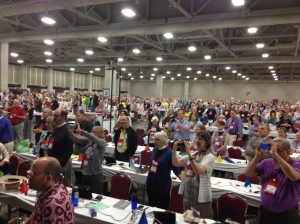 In the middle of the storm, a rumor started to go out. Someone had leaked the information, and we knew it had to be a bishop. So much for being grown ups. The Twittersphere responded by immediately urging everyone not to retweet the leaked name or share it if they had read it. The secrecy was out of respect for the dioceses of all four nominees. One of them was about to lose their bishop, and it would be cruel to toy with them by spreading unconfirmed rumors.
In the middle of the storm, a rumor started to go out. Someone had leaked the information, and we knew it had to be a bishop. So much for being grown ups. The Twittersphere responded by immediately urging everyone not to retweet the leaked name or share it if they had read it. The secrecy was out of respect for the dioceses of all four nominees. One of them was about to lose their bishop, and it would be cruel to toy with them by spreading unconfirmed rumors.
The gallery in the back of the House was standing room only. Photos from the exhibit hall showed it was completely empty. People back home were watching via live stream. At 1:45PM, the committee finally emerged. After more waiting for the electronic and administrative ducks to get in a row, the members came forward and the chair got behind the microphone.
Bishop Michael Curry of North Carolina.
Curry is an incredibly charismatic preacher and a strong believer in evangelism and sharing the love of God. He also happens to be the first African American person to be elected to the office of Presiding Bishop. A cheer rang out and the President reminded us not to applaud. He still wasn’t confirmed. We must respect the deputies of the four dioceses.
The results of the House of Bishops vote went on the screen. He was elected on the first ballot, receiving almost 70% of the votes despite being one of four candidates. It was an absolute landslide. More cheering came from the crowd, and more calls for respect from the President.
The matter was put before the house. The committee was still standing in front, and the President politely suggested they might want to return to their seats so they could vote. We entered our selections into the voting machines at our tables. The confirmation was overwhelming: 800 to 12.
Now you can cheer.
Once the applause died down, the House was put at ease for 20 minutes while Bishop Curry was escorted from the Cathedral over to the House of Deputies. The President announced we would suspend the rules to allow him and his family onto the floor. Even the Presiding Bishop-Elect has to have permission.
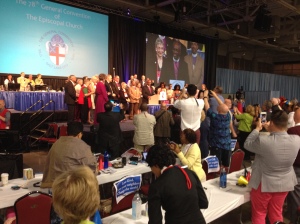 When we were told he was almost there, we stood up in anticipation. The cheering started, and everyone was up on their chairs trying to get a good photo as the Presiding Bishop-Elect walked from the back entrance to the front of the House. He was escorted by current Presiding Bishop Katharine Jefferts-Schori. It was a beautiful sight to see them next to each other. A sign that even as we continue to struggle with diversity in our church, in our hearts we wish to be better.
When we were told he was almost there, we stood up in anticipation. The cheering started, and everyone was up on their chairs trying to get a good photo as the Presiding Bishop-Elect walked from the back entrance to the front of the House. He was escorted by current Presiding Bishop Katharine Jefferts-Schori. It was a beautiful sight to see them next to each other. A sign that even as we continue to struggle with diversity in our church, in our hearts we wish to be better.
As he reached the platform the cheers grew louder, and the singing began. “We are one together, yo, yo, yo!” I saw the delight and shock in Bishop Curry’s eyes. I can’t imagine what it’s like to have your very presence inspire people to burst into song. We are one together.
His speech was short. “I know you haven’t had lunch,” he joked. He was eloquent and to the point as usual, ending with probably the most important fact of all: “Nothing can stop the movement of God’s love in this world.”
Amen.
Day Two: The Privilege of the Minority
I was sitting in the Legislative Committee on Marriage, microphone in hand, when we got the news. The Supreme Court had ruled 5-4 in favor of marriage equality in all 50 states. Because I was speaking at the time, I believe I may have been the last person in the room to know. There was applause and smiles. Our chaplain asked to be excused and ran out the door to call his husband. The youth in the visitor’s gallery began to cry. We had to adjourn early because the news was so important to so many members.
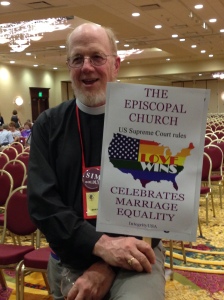 It may surprise people who have known me to be a straight ally my entire life that when the decision came down, I was encouraging the committee members to reach out to the opposition and get their feedback on our proposed changes to the marriage canons. This is not a contradiction for me. I was doing what I always try to do: listening to the minority.
It may surprise people who have known me to be a straight ally my entire life that when the decision came down, I was encouraging the committee members to reach out to the opposition and get their feedback on our proposed changes to the marriage canons. This is not a contradiction for me. I was doing what I always try to do: listening to the minority.
Over the last several General Conventions, a clear and noticeable shift towards liberal and progressive values has occurred in the Episcopal Church. We were once a church of contradictions where conservatives sat next to liberals, but over time our conservative membership has dropped, and their voices are now few and far between.
As LGBT inclusion becomes the more dominant belief, we have to constantly remind ourselves that within the church we now represent a majority, not a minority. While there is still more work to do and there is still a long road ahead, we now have the pleasure of walking into this space knowing most people are like us, agree with us, and act like us. This seems to me to be the very definition of privilege.
I have something very close to the Full Privilege Package, which means I make a fool out of myself often. I forget the needs and feelings of others, I neglect to see the unintended consequences, and worst of all I assume that my experience is true of all experiences. I rely on my friends in disadvantaged positions to keep me honest and to tell me about their experiences so that I might better serve their cause of justice. I can be a wonderful straight ally, but I will never know what it really means to be gay.
In my experience, living without privilege makes it easier for you to see the suffering of others. There is something about the personal experience of being in the minority that opens you up and strengthens your empathy. My gay friends show me this. My black friends show me this. And occasionally I show it to my male friends.
The things is, you can develop and practice this empathy without holding the traditional markers of minority. We all find ourselves in the minority at one time or another. For example, I imagine that no matter what your political beliefs, there has been a time in the last 16 years when you were truly disappointed by the results of a presidential election. How did it feel to see people celebrating? How did it feel to hear voices claiming that this is right when you believed it was wrong?
There is obviously a big difference between feeling politically devastated for a month (or even a few years) and living your life as a marginalized person. But the practice of empathy is the same, and if you practice you will get better.
Today I am celebrating, as are most of my friends. I believe that what has happened is right and just, and that ultimately the political opponents of this lose nothing. Their marriages are the same as always and their churches retain the right to refuse to perform marriages that don’t fit with their theology. The government shouldn’t prevent consenting adults from entering into contracts, and now they won’t. As an American I am very proud.
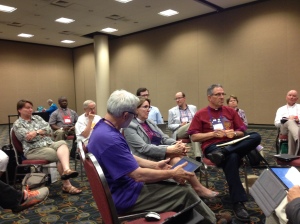 As a Christian and an Episcopalian, I believe this is also what the Holy Spirit has been calling us to do in this church. That part of me is happy, because I feel like I am living into my Baptismal Covenant. But I must also keep a place in my heart for those in my church who are hurt by this, whose upbringing gave them a different view of the world and of faith. They are not just losing to the government or losing to outsiders. They are being told by their own brothers and sisters that their image of God is hateful and wrong. They are a minority in my church, and I imagine they are currently feeling the painful sting of empathetic enlightenment. They are living in a world that is made for others and not for them.
As a Christian and an Episcopalian, I believe this is also what the Holy Spirit has been calling us to do in this church. That part of me is happy, because I feel like I am living into my Baptismal Covenant. But I must also keep a place in my heart for those in my church who are hurt by this, whose upbringing gave them a different view of the world and of faith. They are not just losing to the government or losing to outsiders. They are being told by their own brothers and sisters that their image of God is hateful and wrong. They are a minority in my church, and I imagine they are currently feeling the painful sting of empathetic enlightenment. They are living in a world that is made for others and not for them.
Having laws you don’t like, even church laws you don’t like, is nothing compared to being told your entire life that your very essence is sinful and wrong. But I don’t think it’s helpful to play “who has it worse” when it comes to privilege. The basis of intersectionality is the admission that no minority trumps another in terms of oppression. You can be white but also poor. You can be black but also straight. And you can be a cis-gendered white man in the Episcopal Church, and be told that what you think is terribly wrong. That you are somehow wrong. And you can hear the cheers from the next room and feel like the majority is celebrating your pain.
The charge I place on myself and give to you is this: Don’t forget what it was like to be the loser. We who have been the minority for so long are now the majority, and it is up to us to remain responsible. It is up to us to listen, because we know what it was like to not be heard. It is up to us to show compassion, because we know what it was like to receive only hate (see Exodus 22:21).
I told you that we adjourned the meeting early, however we did not adjourn immediately. First we kept a moment of silence, and we said a prayer for those on the other side. We must give them the love we wished others would have given us. Being in the minority, if only for a little while, can be terrible. But hidden in that pain is the gift of empathy. If you celebrate today, you likely have that gift. Don’t waste it.
Day One: Already Exhausted
Today’s post will be short on both length and substance as the day has been long and my mind is checked out. It’s amazing that I am this beat after so short a time, especially since this is the convention where I have felt most comfortable, most at home. Here are some highlights from the day, some of which may be referenced later in more in-depth posts:
1) A two hour legislative session in which the only substantial matter addressed was the proposed Rules of Order. It’s amazing how dysfunctional we can be in our attempts to function better.
2) A unanimous decision to immediately address a resolution expressing support and condolences for the South Carolina shooting victims and their families. The letter was endorsed without objection and specifically labels the incident as a “racist act of violence.”
3) Having an older cis-gendered heterosexual white man talk about the importance of addressing privilege as he proceeded to interrupt me but not the other two men in the conversation.
4) Getting my own privileged checked when I failed to account for the significant loss in racial diversity that would come from reducing the size of the House of Deputies, a proposal I otherwise support.
5) Secret Young Adult Deputy meeting.
6) Eating McDonald’s for the first time in a long time (not worth it).
7) Hearing many beautiful and passionate responses in the hearing on the proposed marriage canons.
8) Realizing that there is zero agreement on whether or not our Book of Common Prayer is a constitutional document.
9) Being praised by multiple people for sharing a personal experience I didn’t realize was so important.
10) One of the most honest and interesting conversations on sex and marriage and society that I’ve ever had.
I’m going to bed now in the interest of self-care. Tomorrow is another, longer day.
